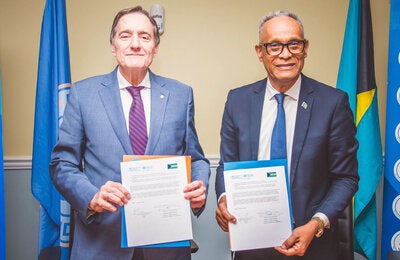

Cancer cases are projected to increase by more than two-thirds worldwide over the next 20 years—from 12.7 million in 2008 to 21.4 million by 2030. However, an estimated 30—40 percent of these cases could be prevented, say experts at the Pan American Health Organization/World Health Organization (PAHO/WHO) and the Union for International Cancer Control.
Joint action needed to promote prevention, improve cancer care
Washington, D.C., February 3, 2012 (PAHO/WHO) — Cancer cases are projected to increase by more than two-thirds worldwide over the next 20 years—from 12.7 million in 2008 to 21.4 million by 2030. However, an estimated 30—40 percent of these cases could be prevented, say experts at the Pan American Health Organization/World Health Organization (PAHO/WHO) and the Union for International Cancer Control.

Nearly two-thirds of the projected cases will occur in low- and middle-income countries, according to WHO. That means that prevention is important for people living in wealthy and poorer countries alike, and all countries need to invest now in better health care to cope with the growing burden of cancer patients.
"We've seen a lot of progress in cancer care and cancer survival in higher-income countries over recent decades," said PAHO Director Dr. Mirta Roses. "But in lower-income countries, the cancer battle is still in its early stages. We need to step up the fight now, before cancer and other chronic diseases overwhelm our health systems."
On Feb. 4, World Cancer Day, PAHO/WHO and the Union for International Cancer Control are teaming up under the slogan "together it is possible" to raise awareness of the growing burden of cancer and to spur action toward more prevention and better treatment of the disease.
"If every person, organization and government does its part, we can reduce premature deaths from cancer as well as other noncommunicable diseases by 25 percent before the year 2020," said Dr. James Hospedales, PAHO senior advisor on chronic diseases. "This would be an enormous impact, and it's possible to achieve."
In the countries of the Americas, cancer is currently the second-leading cause of death (after cardiovascular disease), claiming over 1.1 million lives each year. Leading cancers in the region are lung, prostate and colorectal cancers for men, and breast and cervical cancer for women.
Cancer is a growing problem in the Americas and worldwide for several reasons, chief among them aging populations and changing lifestyles that increase the prevalence of risk factors.
The top risk factors for cancer are:
- Tobacco use
- Being overweight or obese
- Low fruit and vegetable intake
- Lack of physical activity
- Alcohol use
- Sexually transmitted HPV (human papilloma virus) infection
In addition to the 30—40 percent of cancers that can be prevented by reducing these and other risk factors, another 30 percent of cases can be cured or put into remission through screening and early detection followed with effective treatments.
"Investments in both prevention and better treatment are essential if countries are to successfully meet the growing cancer challenge," said Hospedales.
An example is cervical cancer, caused by HPV and which claims the lives of some 25,000 women each year in the Americas. Cervical cancer has a disproportionate impact on poorer countries and population groups, with death rates seven times higher in South and Central America than in North America. Yet it is highly preventable through proven cost-effective interventions including HPV vaccines as well as screening and treatment for early and invasive cancer. The World Cancer Day 2012 campaign calls for joint efforts between governments, nongovernmental organizations and civil society organizations to promote action and investments in areas including tobacco control, promotion of healthy lifestyles, cancer screening and early detection, and improved cancer treatment services, as well as palliative care when cure is not possible.
Last September, the United Nations hosted a special High-level Meeting on the Prevention and Control of Non-communicable Diseases (NCDs), which has helped boost awareness of and action on cancer throughout the Americas. PAHO has created the Pan American Forum for Action on Non-communicable Diseases as a partnership platform to unite various sectors of society to work together in the fight against cancer and other NCDs.
PAHO was established in 1902 and works with all the countries of the Americas to improve the health and quality of life of the people of the Americas. It also serves as the Regional Office for the Americas of the World Health Organization (WHO).
Links:
- Video: Cervical cancer integrated attention in the US Mexico Border
- PAHO chronic disease project
- PAHO Fact Sheet
- PAHO NCD Facebook page
- PAHO twitter for NCDs
- WHO World Cancer Day
- Union for International Cancer Control
- World Cancer Day
- UICC Twitter for World Cancer Day
- Official World Cancer Day site
Media Contacts:
Donna Eberwine-Villagran Tel. Tel. +1 202 974 3122, Mobile +1 202 316 5469, eberwind@paho.org | Leticia Linn Tel. +1 202 974 3440, Mobile +1 202 701 4005, linnl@paho.org | Sonia Mey-Schmidt +1 202 974 3036, Mobile +1 202 251 2646, maysonia@paho.org | Media Relations, Area of Knowledge Management and Communication — www.paho.org



